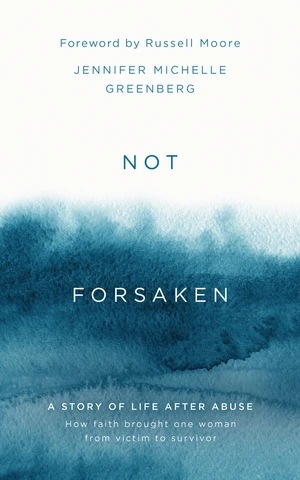
Jennifer Michelle Greenberg
Reviewed by: William Shishko
Not Forsaken: A Story of Life After Abuse, by Jennifer Michelle Greenberg. The Good Book Company, 2019. Hardcover, 232 pages, $16.27 (Amazon). Reviewed by OP pastor William Shishko.
Having a blind eye or a deaf ear to domestic abuse has been called the great scandal of the evangelical church. Wives are too often told that they must submit to it. Children are just to endure it. They are not to report it to the police. “This is the will of God in Christ Jesus concerning you.”
When victims of domestic abuse are given misguided counsel like this, it’s no wonder that they develop a deformed view of God or quit the Christian church (and sometimes the Christian faith) altogether.
Into the painful world of domestic abuse (which—in one form or another—affects twenty people per minute in the United States, according to the National Coalition Against Domestic Violence) comes the powerful contribution of Jennifer Michelle Greenberg in her testimony of “how faith brought one woman from victim to survivor,” Not Forsaken.
You don’t just read this book—you are impacted by it. You don’t enjoy it—but your eyes are opened by it. Its fourteen chapters are feasts, although they are very painful ones to eat. And that’s what makes this non-clinical, heart-bearing treatment of domestic abuse so helpful.
The book faithfully opens up many strands of teaching in the Word of God, and it is rich in the use of Scripture. The author has clearly been influenced by the Reformed faith. At the same time, with glaring honesty she opens up the internal conflicts and heart struggles of victims of abuse. I appreciated that there were no gory or lurid details of Greenberg’s abuse; but, in these pages, there is a masterfully written doorway into her heart.
Each chapter in Not Forsaken is rich and profound. I profited particularly from her insights on “Unearthing the Image of God” (chapter 8), and her down-to-earth applications in “Defining Love” (chapter 12). There is superb material for real-life application in preaching in these chapters (and in all the others).
I did have some quibbles with chapter 12, “The Truth About Forgiveness.” First, I don’t think that the categories “Boundaried Forgiveness” and “Reconciled Forgiveness” are at all helpful. Far better to use the biblical categories of “longsuffering” and “repentance/forgiveness/reconciliation.” Second, Greenberg uncharacteristically lapses into the use of the term “apology” on pages 186 and following, when the phrase should be “ask for forgiveness.” “Apology” gives a reason for something. Sin is, in the nature of the case, contrary to reason. To genuinely ask for forgiveness is to honestly admit that abuse is sin that must not be reasoned away but dealt with ruthlessly at the cross of Christ and humbly at the bar of human conscience. But this is hardly to detract from the worth of this painful picture window on the victims of abuse.
Who should read it? Pastors: To open your eyes to the real internal and external horrors of those in situations of domestic abuse. Counselors: To help you understand and minister to the hearts of your counselees as your understanding is enhanced and as you are ministered to by this case study. Those who have experienced (or are experiencing) domestic abuse: To make you realize that you are not alone and that there is a way of escape.
Thank you, Jennifer Michelle Greenberg, for taking our hands and leading us into the dark world of domestic abuse, even as you always point us to the light of the world, Jesus Christ, and the hope that comes from the gospel of his sovereign grace and mercy.
June 29, 2025
June 22, 2025
June 15, 2025
June 08, 2025
June 01, 2025
Anxiety: Finding the Better Story
May 25, 2025
April 27, 2025
The Devoted Mind: Seeking God’s Face in a World of Distraction
© 2025 The Orthodox Presbyterian Church